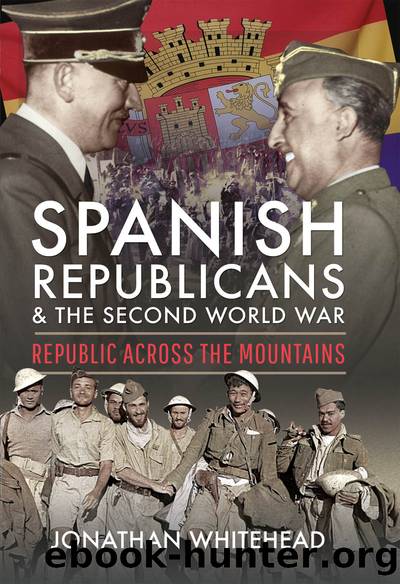Spanish Republicans and the Second World War by Jonathan Whitehead

Author:Jonathan Whitehead
Language: eng
Format: epub
Tags: History / Military / World War II
Publisher: Pen and Sword History
Published: 2021-09-29T00:00:00+00:00
General Franco had a reputation for being cautious, stubborn and yet at the same time unpredictable. He had resisted all efforts by the leaders of the Third Reich to persuade him to commit to war on the side of the Axis on their terms. The invasion of the USSR had now provided him with the means to establish a âtwo-warâ or âtwo-frontâ policy, by which he could express his gratitude to Hitler and appease the most energetic Germanophiles at home by joining the great anti-Communist crusade while avoiding direct confrontation with the British. However, at the very moment that he seemed to have solved the conundrum of how to demonstrate his commitment to the Nazi cause on the Eastern Front without committing himself to a dangerous adventure against the British in the west, he chose to make an extraordinary gesture which once more threw into doubt his intentions.
On 17 July, to mark the fifth anniversary of the military uprising against the Republic, he delivered an address to the Consejo Nacional de la Falange (Falange National Council) in which he warned the USA against any intervention in Europe, and declared that the Allies had failed in their approach to the conflict and had lost the war. He congratulated the German Army on leading âthe battle for which Europe and Christianity have for so many years longedâ, and celebrated the fact that shortly âthe blood of our youth is to mingle with that of our comrades of the Axis as an expression of firm solidarity.â9 At a stroke, he thus irritated the two âAnglo-Saxonâ powers on whose goodwill he depended for food and fuel supplies, and encouraged Hitler to reconsider the feasibility of greater Spanish participation in the Axis war effort.
On 21 August, the DEV commenced its journey to the front. They had been led to believe they were to link up with Army Group Centre and would take part in the Naziâs triumphant entry into Moscow. They were therefore anxious to set out as quickly as possible to ensure they arrived before the war was over. The division was transported by train to three major staging posts: Treuburg (in East Prussia, today Olecko in Poland), Suwalki (Poland) and Grodno (Poland, today Belarus)10. There were reports in Grodno of rising tension between Spanish and German troops and officers. The members of the DEV were particularly unhappy about the Wehrmacht diet which appeared to consist of cold meats, sausage and sauerkraut. The Germans were offended by the lack of discipline of their new comrades and their untidiness and lack of respect for the uniform. Worse was the Spaniardsâ refusal to adapt their behaviour to the strict protocols of Nazi racial policies: they continued to fraternize with Jewish and Polish women despite threats from the German officers and were antagonized by the brutality of the Nazis towards POWs, particularly the Poles, whom the Spanish did not identify as enemies.11
Either because the Wehrmacht lacked transport or because there were some in the German armed forces
Download
This site does not store any files on its server. We only index and link to content provided by other sites. Please contact the content providers to delete copyright contents if any and email us, we'll remove relevant links or contents immediately.
| Africa | Americas |
| Arctic & Antarctica | Asia |
| Australia & Oceania | Europe |
| Middle East | Russia |
| United States | World |
| Ancient Civilizations | Military |
| Historical Study & Educational Resources |
Magic and Divination in Early Islam by Emilie Savage-Smith;(1204)
Ambition and Desire: The Dangerous Life of Josephine Bonaparte by Kate Williams(1099)
Operation Vengeance: The Astonishing Aerial Ambush That Changed World War II by Dan Hampton(990)
What Really Happened: The Death of Hitler by Robert J. Hutchinson(886)
London in the Twentieth Century by Jerry White(858)
Time of the Magicians by Wolfram Eilenberger(850)
Twilight of the Gods by Ian W. Toll(824)
The Japanese by Christopher Harding(813)
Papillon by Henry Charrière(807)
Lenin: A Biography by Robert Service(789)
The Devil You Know by Charles M. Blow(786)
Twelve Caesars by Mary Beard(780)
Freemasons for Dummies by Hodapp Christopher;(754)
The Churchill Complex by Ian Buruma(735)
Bohemians, Bootleggers, Flappers, and Swells: The Best of Early Vanity Fair by Bohemians Bootleggers Flappers & Swells- The Best of Early Vanity Fair (epub)(716)
Napolean Hill Collection by Napoleon Hill(708)
Henry III by David Carpenter;(699)
The Enlightenment by Ritchie Robertson(698)
The Rise and Triumph of the Modern Self by Unknown(689)
